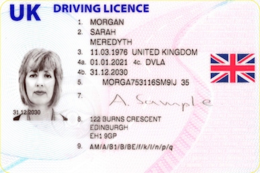Background
Terry Grismer was a mining truck driver who, after suffering from a stroke in 1984, suffered from homonymous hemianopia (H.H.), a visual disability that reduces the scope of peripheral vision. After the stroke the Superintendent of Motor Vehicles cancelled his driver's licence on the grounds that his condition made him incapable of meeting the minimum standard for peripheral vision required when driving. This rule applied to all people who suffered from H.H.
Grismer brought a complaint to the Human Rights Commission for discrimination against the disabled. The Human Rights Tribunal found that the Superintendent directly discriminated and ordered a reassessment of his (Grismer's) visual abilities.
The issue before the Supreme Court of Canada was whether the complete prohibition against people with H.H. from driving was a reasonable standard under the requirements established in the Meiorin case.
Reasons of the court
McLachlin, writing for a unanimous Court, found that the Superintendent discriminated against Grismer.
McLachlin found that the Meiorin test for determining if a standard is a bona fide occupational requirement applied not just in the employment context but to all circumstances of discrimination where accommodation may be available.
In considering Grismer's situation, McLachlin found that there was prima facie discrimination as his licence was cancelled on the basis of a disability. She then applied the Meiorin test and found that the discrimination was not justifiable. The goal of the prohibition was to protect the public which was rationally connected to the issuing of licences. The practice was also found to be in good faith. The standard failed the third step as it was not reasonably necessary to accomplish the goal. Furthermore, the Superintendent failed to show that any accommodation such as allowing individual testing would constitute undue hardship.
An undue hardship is special or specified circumstances that partially or fully exempt a person or organization from performance of a legal obligation so as to avoid an unreasonable or disproportionate burden or obstacle.

The Disability Discrimination Act 1995 is an Act of the Parliament of the United Kingdom which has now been repealed and replaced by the Equality Act 2010, except in Northern Ireland where the Act still applies. Formerly, it made it unlawful to discriminate against people in respect of their disabilities in relation to employment, the provision of goods and services, education and transport.

A commercial driver's license is a driver's license required to operate large, heavy, or placarded hazardous material vehicles in commerce.
Section 15 of the Canadian Charter of Rights and Freedoms contains guaranteed equality rights. As part of the Constitution, the section prohibits certain forms of discrimination perpetrated by the governments of Canada with the exception of ameliorative programs and rights or privileges guaranteed by or under the Constitution of Canada in respect of denominational, separate or dissentient schools.

British Columbia v British Columbia Government Service Employees' Union [1999] 3 SCR 3, 1999 SCC 48 – called Meiorin for short – is a Supreme Court of Canada case that created a unified test to determine if a violation of human rights legislation can be justified as a bona fide occupational requirement (BFOR).

R v Hundal [1993] 1 S.C.R. 867, is one of several landmark Supreme Court of Canada cases where the court showed its first signs of moving away from the strict requirement for subjectively proven mens rea in criminal offences.

Freedom of religion in Canada is a constitutionally protected right, allowing believers the freedom to assemble and worship without limitation or interference.

The Pregnancy Discrimination Act (PDA) of 1978 is a United States federal statute. It amended Title VII of the Civil Rights Act of 1964 to "prohibit sex discrimination on the basis of pregnancy."

Auton v British Columbia (AG), [2004] 3 S.C.R. 657, 2004 SCC 78 is a leading decision of the Supreme Court of Canada wherein the Court ruled that government funding for non-core medically necessary treatments is not protected under section 15(1) of the Canadian Charter of Rights and Freedoms.

R v Clay [2003] 3 S.C.R. 735, 2003 SCC 75 is a decision by the Supreme Court of Canada on the constitutionality of the prohibition to possess marijuana. The accused claimed that his section 7 Charter rights were violated. The Court dismissed the claim.

Canada (AG) v Mossop, [1993] 1 SCR 554 was the first decision of the Supreme Court of Canada to consider equality rights for gays. The case is also significant as one of Justice L'Heureux-Dube's most famous dissents where she proposes an evolving model of the "family".
In India, a driving licence is an official document that authorises its holder to operate various types of motor vehicles on highways and some other roads to which the public have access. In various Indian states, they are administered by the Regional Transport Authorities/Offices (RTA/RTO). A driving licence is required in India by any person driving a vehicle on any highway or other road defined in the Motor Vehicles Act, 1988.

In the United Kingdom, a driving licence is the official document which authorises its holder to operate motor vehicles on highways and other public roads. It is administered in England, Scotland and Wales by the Driver and Vehicle Licensing Agency (DVLA) and in Northern Ireland by the Driver & Vehicle Agency (DVA). A driving licence is required in England, Scotland, and Wales for any person driving a vehicle on any highway or other "road", as defined in s.192 Road Traffic Act 1988, irrespective of the ownership of the land over which the road passes. Similar requirements apply in Northern Ireland under the Road Traffic Order 1981.
As long as Great Britain and Northern Ireland remains within the European Union, a UK driving licence is a European driving licence.

The ADA Amendments Act of 2008 is an Act of Congress, effective January 1, 2009, that amended the Americans with Disabilities Act of 1990 (ADA) and other disability nondiscrimination laws at the Federal level of the United States.
Impaired driving is the term used in Canada to describe the criminal offence of operating,having care or the control of a motor vehicle while the person's ability to operate the motor vehicle is impaired by alcohol or a drug. Impaired driving is punishable under multiple offences in the Criminal Code, with greater penalties depending on the harm caused by the impaired driving. It can also result in various types of driver's licence suspensions.
Loss of rights due to criminal conviction refers to the practice in some countries of reducing the rights of individuals who have been convicted of a criminal offence. The restrictions are in addition to other penalties such as incarceration or fines. In addition to restrictions imposed directly upon conviction, there can also be collateral civil consequences resulting from a criminal conviction, but which are not imposed directly by the courts as a result of the conviction.
The Human Rights Tribunal of Ontario is an administrative tribunal in Ontario, Canada that hears and determines applications brought under the Ontario Human Rights Code, the provincial statute that sets out human or civil rights in Ontario prohibiting discrimination on the basis of a number of grounds in certain social areas.
The "comparator group" is an element that has been used in Canadian jurisprudence to analyze statutory human rights complaints and claims pursuant to section 15 of the Canadian Charter of Rights and Freedoms. Section 15 guarantees equality rights and the right to be free from discrimination on certain enumerated grounds.
Young v. United Parcel Service, 575 U.S. ___ (2015), is a United States Supreme Court case that the Court evaluated the requirements for bringing a disparate treatment claim under the Pregnancy Discrimination Act. In a 6-3 decision, the Court held that to bring such a claim, a pregnant employee must show that their employer refused to provide accommodations and that the employer later provided accommodations to other employees with similar restrictions. The Court then remanded the case to the United States Court of Appeals for the Fourth Circuit to determine whether the employer engaged in discrimination under this new test.
Disability rights are not specifically addressed by legislation in New Zealand. Instead, disability rights are addressed through human rights legislation. Human rights in New Zealand are protected by the New Zealand Bill of Rights Act 1990 and the Human Rights Act 1993. New Zealand also signed and ratified the United Nations Convention on the Rights of Persons with Disabilities (CRPD) in 2008.







